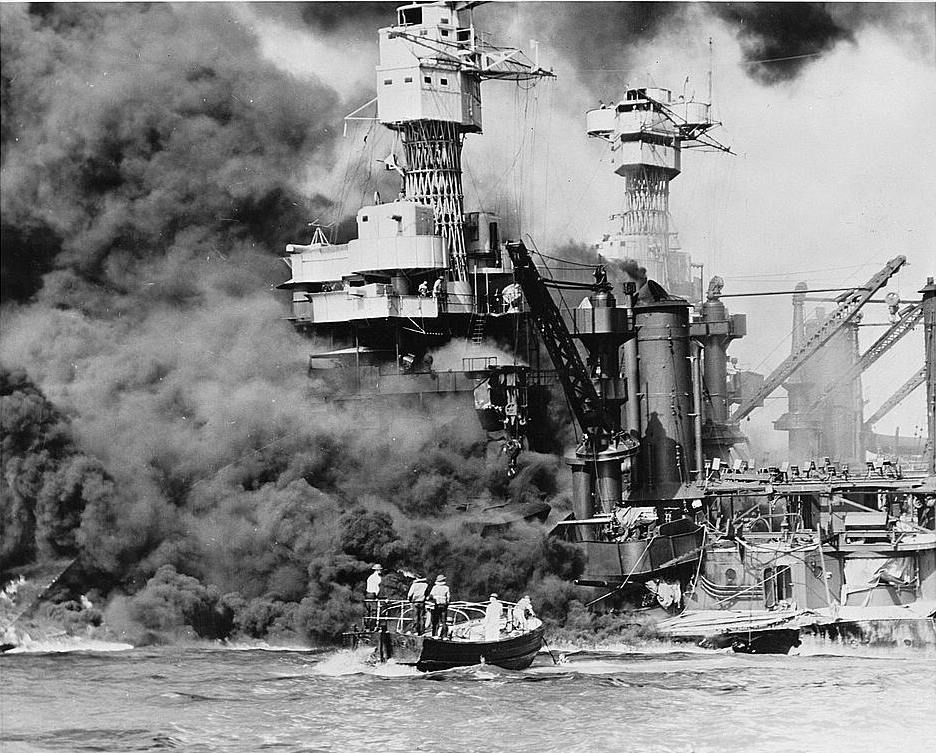DECEMBER 7, 2022 – Today in 1941 is the “day [that] will live in infamy,” so said President Roosevelt—the second Roosevelt, but I’ll come back to that later—in his speech to a joint session of Congress the day after the Japanese attack on Pearl Harbor. “In infamy,” as it turns out, doesn’t mean “in eternity.” A poll conducted by Lincoln Park Strategies, a global opinion research firm, whose work is cited by the Institute for Citizens & Scholars (formerly the Woodrow Wilson—the only one; again, stay tuned—National Fellowship Foundation), two-thirds of Americans polled in 2018 couldn’t identify the countries we fought in World War II—Japan, of course, being one of our two primary enemies.
The passage of time doesn’t favor a recovery of our collective memory: the youngest WW II American veteran—someone who turned 18 in 1945, the last year of the conflict, would now be 94; that would make the youngest kid of the youngest WW II veteran a mature 77. With each passing year there will be less exposure to Tora, Tora, Tora! and the more recent Pearl Harbor, starring Ben Affleck but made and released over a generation ago.
As Vietnam, the Cold War, 9-11 (and “United We Stand”) and Iraq/Afghanistan are displaced by memories of Covid-pandemic lockdowns, the invasion of Ukraine and January 6—themselves overshadowed by the more immediate “crisis” of five-buck-a-gallon gasoline (back when that was a thing)—the attack on Pearl Harbor will go the way of the sinking of Lusitania . . . of what? In other words, in time the surprise raid on the American naval base parked halfway across the Pacific will sink below the waterline of our national consciousness.
National amnesia might not be an entirely bad thing. Witness the centuries-old animosities in the Middle East and the Balkans. Besides, our disregard for the past is reflective of a practical capacity problem: who has the bandwidth to remember all that is to be remembered, infamous or otherwise?
On the other hand, more should be expected of Boomers than of subsequent generations. If we didn’t learn what we should have about Jim Crow America, the Red Scare and anti-Semitism, we have no excuse for not remembering what we did surely did learn. I remember my shock when a close acquaintance, a Boomer who was my elder, asked me how the U.S. had gotten involved in WW I. After I explained, he asked, “So, who was president then?”
Trying hard to hide my surprise at his ignorance, I said politely, “Wilson.”
“Uhhh . . . the person hesitated. “Which one?”
“The only one,” I said in disbelief. I was even more shocked when I pondered the implication of his question. Surely he’d been thinking “Roosevelts,” but that would mean he didn’t know that FDR had been president on December 7, 1941. Yet this person had had the audacity of pronouncing in the same conversation that “Obama was by far the worst president in our history.”
Anyone who asks, “Which [Wilson]?” with regard to who was president during WW I, has no standing to rank President Obama as our “worst” president.
In remembering this day back in 1941, maybe we need to learn a few more things about our past.
(Remember to subscribe to this blog and receive notifications of new posts by email.)
© 2022 by Eric Nilsson

2 Comments
Eric, I loved this post. As a fellow history geek, I often experience the same shocked reaction to comments and questions people make to me, especially someone who recently said to me that Lincoln supported slavery. Last week, I had occasion to go to the civil war battlefield in Tennessee where my great grandfather was killed in a major battle. The spot where he gave his life is now a Sam’s Club. As the great consumer society grinds on, perhaps it is inevitable that we forget our history, but it is a well known aphorism that those who do not know their history are bound to repeat it. So you (and me, to a lesser extent) have to keep it alive.
Thanks, Ginny, for this interesting (and supportive) comment. A couple of years ago (seems like yesterday, but hey!–I’m a “history major,” so time is compressed), I posted on this blog a piece about a boyhood friend whose great-great grandfather was one of the first Minnesota volunteers for the Union Army and fought at Gettysburg (and an uncle was awarded the medal of honor in WW II). I was about seven when I learned about these, and knowing someone with a lineage connection to the Civil War and WW II had an effect on me–as had my dad’s deep interest in the Civil War, which led to a lot of stops at historic sites during our trip “Down South” when I was in kindergarten. — Eric
Comments are closed.